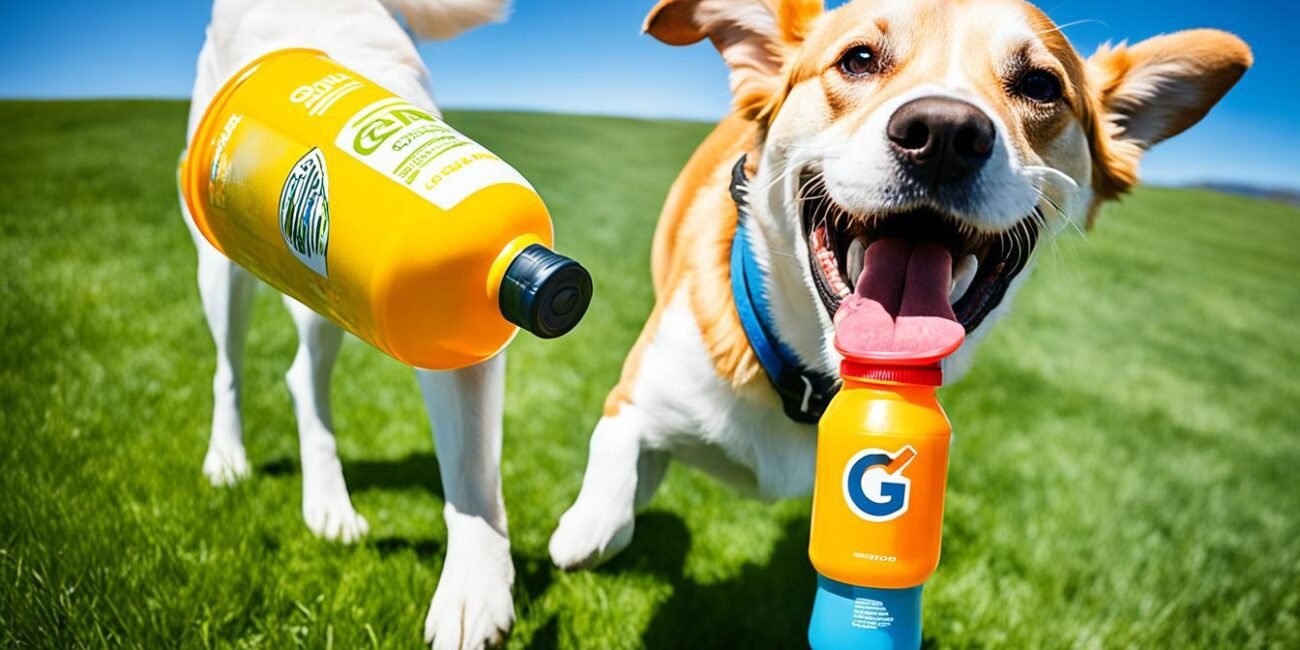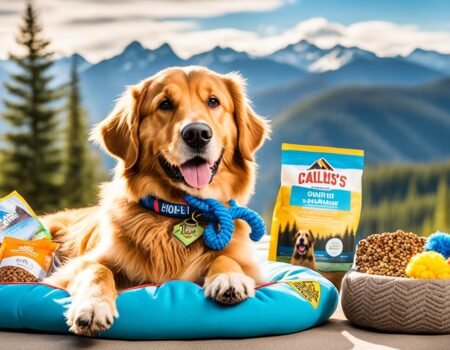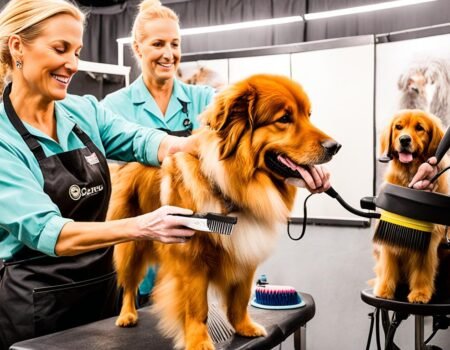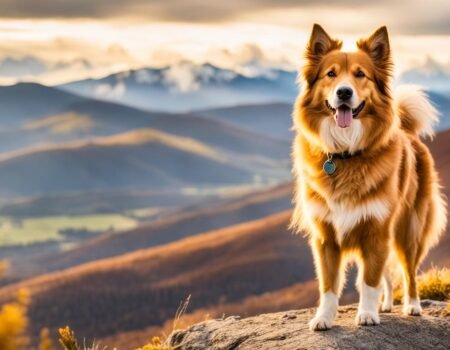Did you know that approximately 90 million households in the United States own a dog? That’s a lot of furry friends relying on us to keep them safe and healthy. When it comes to hydration, many dog owners wonder if they can share their favorite sports drink, Gatorade, with their canine companions. We all know that staying hydrated is essential, but is Gatorade a safe option for dogs?
Before we dive into the specifics, let’s address the topic of canine hydration. Just like humans, dogs need proper hydration to support their bodily functions and overall well-being. Water plays a crucial role in digestion, nutrient absorption, circulation, and temperature regulation for our furry friends. So, it’s important to make sure they have access to clean water at all times, especially during hot weather or after physical activity.
Key Takeaways:
- Gatorade can be harmful to dogs due to its high sugar content, sodium, and artificial additives.
- Water is the best and safest option for keeping dogs hydrated.
- Dogs may require electrolyte replenishment in certain situations, consult a veterinarian for appropriate options.
- Monitor your dog’s water intake and provide access to fresh water at all times to prevent dehydration.
- Signs of dehydration in dogs include excessive panting, dry gums and nose, loss of skin elasticity, and lethargy.
Importance of Hydration for Dogs
Dogs, like humans, need proper hydration to support their bodily functions and maintain overall health. Hydration is essential for dogs as water plays a crucial role in various bodily processes, including digestion, nutrient absorption, circulation, and temperature regulation.
Just like us, dogs rely on water to keep their bodies functioning optimally. It helps them break down food and absorb essential nutrients, deliver oxygen and nutrients to their cells, and regulate their body temperature. Without adequate hydration, dogs may experience discomfort and various health issues.
Proper hydration is not only important for keeping your dog’s body running smoothly but also plays a significant role in promoting their overall well-being.
During hot weather or after physical activity, dogs need to replenish the fluids they lose through panting and sweating. This is when pet health drinks and supplements can be beneficial in maintaining their hydration levels.
Canine Hydration and Pet Health Drinks
While water remains the most important and essential source of hydration for dogs, certain pet health drinks can provide additional benefits. These specially formulated beverages can help replenish electrolytes and provide essential nutrients to support your dog’s overall health.
Pet health drinks are designed to provide hydration with additional benefits. They may contain electrolytes such as potassium and sodium, which are essential for maintaining proper bodily functions. These drinks can prove especially useful during periods of increased physical activity or when your dog is recovering from illness or dehydration.
When considering pet health drinks, it’s important to choose those specifically formulated for dogs to ensure they meet their unique nutritional requirements. Always consult with your veterinarian to determine the appropriate and safe options for your dog’s specific needs.
Monitoring Your Dog’s Hydration Level
It’s crucial to regularly monitor your dog’s hydration level to ensure they are receiving adequate water intake. Here are some signs that indicate your dog may be dehydrated:
- Excessive panting
- Dry gums and nose
- Loss of skin elasticity
- Lethargy and reduced energy levels
- Thick saliva
If you notice any of these signs, offer your dog fresh water immediately. In severe cases or if the symptoms persist, consult your veterinarian for guidance.
It’s also important to ensure that your dog has access to clean water at all times. Keep an eye on their water bowl and refill it regularly to make sure they have a constant supply of fresh water. During hot weather or after exercise, you may need to offer your dog water more frequently to prevent dehydration.
The Dangers of Giving Gatorade to Dogs
When it comes to quenching our thirst after a workout or on a hot day, Gatorade often comes to mind as a popular choice. But is it safe for our furry friends? Let’s dive into the potential risks of giving Gatorade to dogs and why it’s important to exercise caution.
Sugar Overload and Health Risks
Gatorade is well-known for its high sugar content, which can be dangerous for dogs. Just like humans, excessive sugar intake can lead to weight gain, dental problems, and an increased risk of diabetes. Our pets rely on us to make healthy choices for them, so it’s best to avoid giving them drinks that are packed with unnecessary sugars.
Artificial Additives and Digestive Upset
Another concern with Gatorade is the presence of artificial additives. These additives can cause gastrointestinal upset and allergies in dogs, resulting in symptoms like vomiting or diarrhea. Our furry friends have delicate stomachs, and it’s important to provide them with foods and beverages that are gentle on their digestive systems.
Disrupting Electrolyte Balance
Dogs have specific electrolyte requirements, and giving them Gatorade can disrupt their natural balance. While Gatorade is designed to replenish electrolytes in humans, the electrolyte composition is not suitable for our canine companions. It’s crucial to keep their electrolytes in check, but we should rely on options specifically formulated for their needs.
High Sodium Content and Pre-existing Health Conditions
Gatorade also contains a significant amount of sodium, which can be detrimental to dogs, particularly those with pre-existing health conditions. Excessive sodium intake can worsen conditions like high blood pressure or heart disease. Our pets’ well-being is our top priority, so it’s essential to steer clear of beverages that may put their health at risk.
“Excessive sugar intake can lead to weight gain, dental problems, and an increased risk of diabetes in dogs.”
While Gatorade may seem like a refreshing option, it’s crucial to prioritize the safety and health of our furry friends. Opting for alternatives that meet their hydration needs without the added risks is a responsible choice. Fresh water, dog-specific electrolyte solutions recommended by a veterinarian, or homemade hydration options can provide our pets with the hydration they need without compromising their well-being.
Alternative Hydration Options for Dogs
When it comes to keeping our furry friends hydrated, fresh water is always the go-to choice. However, there are other options available that can provide additional benefits to dogs. Let’s explore some alternative hydration options that are safe and enjoyable for your four-legged companions.
Dog-Specific Electrolyte Solutions: In certain situations, such as when a dog is sick or has engaged in excessive exercise, electrolyte solutions designed specifically for dogs can be a great choice. These solutions are recommended by veterinarians and can help replenish electrolytes effectively.
| Brand | Key Features |
|---|---|
| Brand A | Contains essential electrolytes |
| Brand B | Specifically formulated for canine hydration |
| Brand C | No artificial additives |
Homemade Hydration Solutions: Another option for keeping dogs hydrated is to create homemade hydration solutions. Mixing water with low-sodium chicken or beef broth can provide a tasty and hydrating treat for your furry friend. Just be sure to use low-sodium options to avoid any adverse effects.
However, it’s essential to consult a veterinarian before introducing any new hydration options to your dog. They can provide personalized advice based on your dog’s specific needs and health conditions.
Including alternative hydration options in your dog’s routine can help keep them hydrated and satisfied. Whether it’s a dog-specific electrolyte solution or a homemade hydration treat, there are plenty of choices to keep your furry friend well-hydrated and healthy.
Signs of Dehydration in Dogs
When it comes to canine hydration, it’s essential to be aware of the signs of dehydration in dogs. Recognizing these signs early can help prevent further health complications and ensure your furry friend stays happy and healthy. Here are some common indicators that your dog may be dehydrated:
- Excessive panting: Dogs rely on panting to regulate their body temperature, but excessive panting could be a sign of dehydration.
- Dry gums and nose: Dehydration can cause dryness in the gums and nose. Check for any signs of dryness or stickiness.
- Loss of skin elasticity: Gently pull up on the skin between your dog’s shoulder blades. If it doesn’t immediately bounce back into place, it could be a sign of dehydration.
- Lethargy: A lack of energy or enthusiasm may indicate that your dog is dehydrated.
- Decreased appetite: Dehydration can lead to a loss of appetite in dogs. If your dog refuses to eat or shows disinterest in food, it may be a cause for concern.
- Sunken eyes: Dehydration can make your dog’s eyes appear sunken or dull.
If you notice any of these symptoms in your furry companion, it’s important to take immediate action. Offer your dog fresh water and encourage them to drink. However, if the signs persist or worsen, it’s crucial to consult a veterinarian for guidance and appropriate treatment.
Remember, prevention is key when it comes to dehydration in dogs. Make sure your pet has constant access to clean water, especially during hot weather or after physical activity. Regularly monitor their water intake and be vigilant for any changes in behavior or signs of dehydration.
Expert Tip:
Dr. Sarah Johnson, Veterinarian: “Dehydration in dogs can be a serious health concern. It’s important to pay attention to any signs of dehydration and take prompt action to address the issue. Always consult your veterinarian if you have any concerns about your dog’s hydration levels.”
By being proactive and knowledgeable about the signs of dehydration, you can help ensure that your canine companion stays hydrated and healthy.
| Signs of Dehydration in Dogs | Actions to Take |
|---|---|
| Excessive panting | Offer fresh water and monitor their drinking |
| Dry gums and nose | Encourage drinking and consult a veterinarian if symptoms persist |
| Loss of skin elasticity | Provide fresh water and seek veterinary guidance |
| Lethargy | Monitor water intake and consult a veterinarian if lethargy persists |
| Decreased appetite | Offer fresh water and seek veterinary advice if appetite loss continues |
| Sunken eyes | Provide water and consult a veterinarian if dehydration symptoms persist |
Remember, your dog’s well-being depends on proper hydration. Stay vigilant, take quick action if you observe any signs of dehydration, and always consult a veterinarian for guidance and support.
Tips for Preventing Dehydration in Dogs
To prevent dehydration in dogs, it is important to take proactive measures and ensure they have adequate access to fresh and clean water. Here are some tips to keep your furry friend properly hydrated:
- Provide constant access to fresh water: Make sure your dog always has access to a clean water source. This means regularly refreshing their water bowl throughout the day and ensuring it is filled at all times.
- Monitor water intake: Keep an eye on how much water your dog is drinking, especially during hot weather or after physical activity. If you notice a significant decrease in their water intake, it could be a sign of dehydration.
- Consider water quality: The quality of the water you provide for your dog matters. Ensure that the water is filtered, free from contaminants, and safe for consumption. If you have concerns about the quality of your tap water, consider using a water filtration system or providing bottled water.
- Offer water during meals and exercise: Encourage your dog to drink water during meal times and after physical activity. This helps replenish fluids lost during digestion and exercise.
- Carry water when traveling: Whether you’re going for a short walk or a long road trip, always carry an adequate supply of water for your dog. Dehydration can occur quickly, so having water on hand ensures that your dog stays hydrated, especially in unfamiliar environments.
“Proper hydration plays a crucial role in maintaining your dog’s overall health and well-being. By making sure they have access to clean water and monitoring their water intake, you can help prevent dehydration and ensure their happiness.”
Recognizing the Signs of Dehydration
It’s essential to be able to recognize the signs of dehydration in dogs. If you notice any of the following symptoms, it’s crucial to take immediate action:
- Excessive panting
- Dry gums and nose
- Loss of skin elasticity
- Lethargy
- Decreased appetite
- Sunken eyes
If you suspect your dog is dehydrated, offer them fresh water and consult a veterinarian for guidance.
By following these tips and keeping a close eye on your dog’s water intake, you can help ensure that they stay properly hydrated and healthy.
Understanding Dog Sweating and Hydration
Dogs have a different way of cooling off compared to humans. While we sweat to regulate our body temperature, dogs primarily cool themselves through panting and evaporation. Unlike humans, dogs do not release the same amount of salts through their sweat glands. However, this does not diminish the importance of adequate hydration for dogs, especially during hot weather or after physical activity.
When dogs get hot, they still need to replenish the fluids they lose through panting. While their sweating mechanism may be different from ours, the need for hydration remains crucial to their overall well-being. It’s essential to provide them with access to clean and fresh water to ensure they stay properly hydrated.
Hydration plays a vital role in various bodily functions for dogs. Water helps with digestion, nutrient absorption, circulation, and temperature regulation. It supports their overall health and keeps their systems functioning optimally.
“Unlike humans, dogs primarily cool themselves through panting and evaporation.”
While dogs do not require as much water as humans, it’s still necessary to encourage them to drink when they are hot or after physical exertion. Pay attention to the signs of dehydration mentioned in section 5, which can occur if they do not receive enough fluids.
To emphasize the importance of hydration for dogs, let’s look at a comparison of canine sweating and hydration with that of humans:
| Dogs | Humans | |
|---|---|---|
| Sweating | Panting and minimal sweat | Sweating from numerous sweat glands |
| Fluid Loss | Mainly through panting | Significant fluid loss through sweating |
| Salt Loss | Minimal salt loss through panting | Substantial salt loss through sweat |
| Hydration Needs | Adequate water intake to replenish fluids | Significant water intake for hydration |
The Importance of Hydration for Canine Health
Proper hydration is essential for maintaining a dog’s health and well-being. It supports their body’s functions and helps prevent dehydration and related complications.
- Water aids in digestion and nutrient absorption, ensuring optimal nutrient utilization.
- Hydration facilitates efficient circulation, promoting proper blood flow and oxygenation.
- It plays a crucial role in regulating body temperature, preventing overheating and heat-related illnesses.
- Proper hydration supports overall organ function and helps flush out toxins.
As responsible dog owners, it’s our duty to ensure our furry companions have access to clean and fresh water at all times. Proper hydration is key to their health and well-being. By understanding their unique sweating mechanisms and hydration needs, we can provide them with the care they deserve.
The Good and Bad of Gatorade for Dogs
Gatorade, a popular sports drink, is not necessary for dogs’ hydration and may have negative effects on their health. While it can help replenish electrolytes in certain situations, regular usage of Gatorade can lead to issues due to its high sugar, sodium, and artificial additives.
Excess sugar in Gatorade can contribute to weight gain, dental problems, and an increased risk of diabetes in dogs. The high sodium content can be detrimental, especially for dogs with pre-existing health conditions.
However, there are situations where electrolyte replenishment is necessary for sick or weak dogs. In those cases, it is best to opt for dog-specific electrolyte solutions or infant electrolyte drinks like Pedialyte, which are formulated to meet their specific needs.
“Gatorade, while not recommended for regular use, can be given to dogs in moderation when they require electrolyte replenishment.”
It’s important to remember that fresh water is the best and safest option for keeping dogs hydrated. Water supports their bodily functions and plays a crucial role in digestion, nutrient absorption, circulation, and temperature regulation.
If you have concerns about your dog’s hydration or electrolyte balance, it’s always best to consult with a veterinarian. They can provide guidance on the specific needs of your dog and recommend appropriate hydration options.
| Gatorade for Dogs | Pros | Cons |
|---|---|---|
| Electrolyte Replenishment | – Can help replace lost electrolytes in certain situations – May be beneficial for sick or weak dogs in need of hydration – Can be used as a short-term solution |
– High sugar content may contribute to weight gain and dental problems – Excess sodium can be harmful, especially for dogs with certain health conditions – Artificial additives may cause gastrointestinal upset or allergies |
| Regular Usage | – Not necessary for dogs’ hydration | – Excessive sugar and sodium can lead to health issues – Artificial additives may have negative effects on dogs‘ well-being |
Can Dogs Drink Gatorade? A Clear Conclusion
After examining the safety of Gatorade for dogs, we have reached a clear conclusion. While dogs can drink Gatorade in small amounts, it is not necessary for their hydration needs. Regular consumption of Gatorade is not recommended due to its high sugar, sodium, and artificial additives. Fresh water is the optimal and safest choice for keeping dogs properly hydrated.
If your dog requires electrolyte replenishment, it is crucial to consult a veterinarian for appropriate options. They can provide guidance on dog-specific electrolyte solutions or other suitable alternatives that meet your dog’s specific needs.
Remember, maintaining your dog’s overall health and well-being is our top priority. Providing access to clean water and monitoring their water intake is key to ensuring proper hydration for dogs.
We understand that you want the best for your furry companions, which is why we advise against relying on Gatorade as a primary source of hydration for dogs. Let’s prioritize their health and choose safer alternatives for their well-being.
The Importance of Proper Hydration for Dogs
Proper hydration is crucial for maintaining a dog’s health and well-being. Water plays a vital role in supporting key bodily functions in dogs, including:
- Digestion
- Nutrient absorption
- Circulation
- Temperature regulation
Dogs should have regular access to clean water to ensure they stay hydrated. Monitoring their water intake is especially important during hot weather or after physical activity.
As responsible pet owners, it’s our duty to prioritize our furry friends’ hydration needs. And while water is undoubtedly the best option for canine hydration, there are also pet health drinks available in the market that can help support their overall well-being.
Not only do these pet health drinks provide hydration, but they also contain additional beneficial ingredients that can enhance your dog’s health.
These drinks are specially formulated to meet the unique hydration requirements of dogs and come in delicious flavors that dogs love. They are packed with essential electrolytes and nutrients to replenish their energy levels and support their overall health.
| Pet Health Drink | Benefits |
|---|---|
| Brand X Hydration Boost | Provides a balanced blend of electrolytes and vitamins for optimal canine hydration |
| Brand Y Vitality Elixir | Contains natural antioxidants and probiotics to support immune health |
| Brand Z Active Rescue | Offers joint support and reduces inflammation with added glucosamine and omega-3 fatty acids |
These pet health drinks are a convenient and tasty way to ensure your dog receives the hydration they need while enjoying additional health benefits. And remember, always consult with your veterinarian to determine the best hydration practices and products for your furry companion.
Conclusion
After careful consideration, we have reached the conclusion that while Gatorade can be given to dogs in small amounts, it is not necessary for their hydration. In fact, it can potentially be harmful due to its high sugar, sodium, and artificial additives. Dogs, like humans, primarily need fresh water to stay adequately hydrated.
For dogs with specific needs, such as those recovering from illness or engaging in excessive exercise, alternative options like dog-specific electrolyte solutions are available. These solutions are formulated to meet the specific electrolyte requirements of dogs and are recommended by veterinarians. It is always best to consult a veterinary professional for guidance on maintaining your dog’s hydration and overall health.
Remember, dogs rely on us to provide them with the proper care and nutrition they need. Ensuring they have access to clean water at all times is essential for their well-being. If you have any concerns about your dog’s hydration or any other aspect of their health, we encourage you to reach out to a trusted veterinarian. Your furry friend will thank you for it!
FAQ
Is Gatorade safe for dogs to drink?
Yes, dogs can drink Gatorade in small amounts, but caution must be taken due to the sugar and sodium content. It’s important to dilute Gatorade with water and give it to dogs in moderation.
Why is hydration important for dogs?
Hydration is important for dogs to support bodily functions, digestion, nutrient absorption, circulation, and temperature regulation. It’s especially crucial during hot weather or after physical activity.
What are the dangers of giving Gatorade to dogs?
Giving Gatorade to dogs can be harmful due to its high sugar content, artificial additives, electrolyte imbalance, and sodium content. It can lead to weight gain, dental problems, and an increased risk of diabetes in dogs.
What are the alternative hydration options for dogs?
Fresh water is the best and safest option for dogs’ hydration. Dog-specific electrolyte solutions recommended by a veterinarian or homemade solutions with low-sodium broth can also be used.
What are the signs of dehydration in dogs?
Common signs of dehydration in dogs include excessive panting, dry gums and nose, loss of skin elasticity, lethargy, decreased appetite, and sunken eyes.
How can I prevent dehydration in my dog?
To prevent dehydration in dogs, provide them with access to fresh and clean water at all times. Monitor their water intake, especially during hot weather or after physical activity. Consider the quality of the water you provide for your dog and offer water during meals and exercise.
How do dogs sweat and stay hydrated?
Dogs cool off mainly through panting and lose moisture through evaporation. Unlike humans, dogs do not lose the same amount of salts through panting. Therefore, dogs still need adequate water intake when they get hot, but not as much as humans.
What are the pros and cons of Gatorade for dogs?
The cons of giving Gatorade to dogs include its high sugar, sodium, and artificial additives. The pros include replenishing electrolytes in certain situations. However, regular usage of Gatorade is not recommended due to its potential health issues in dogs.
Can dogs drink Gatorade?
Dogs can drink Gatorade in small amounts, but it is not necessary for their hydration. Fresh water is the best option for dogs, and alternative solutions can be used for specific needs.
Why is proper hydration important for dogs?
Proper hydration is crucial for maintaining a dog’s health and well-being. Water supports key bodily functions in dogs, including digestion, nutrient absorption, circulation, and temperature regulation.
What is the conclusion about dogs and Gatorade?
While dogs can drink Gatorade in small amounts, it is not necessary for their hydration and can be potentially harmful due to its high sugar, sodium, and artificial additives. It’s best to consult a veterinarian for advice on maintaining your dog’s hydration and overall health.










No Comment! Be the first one.